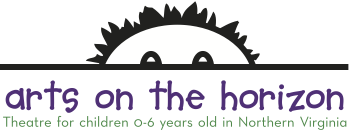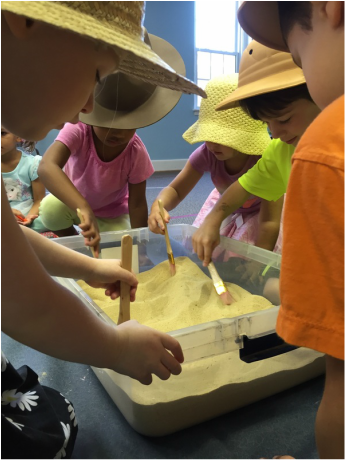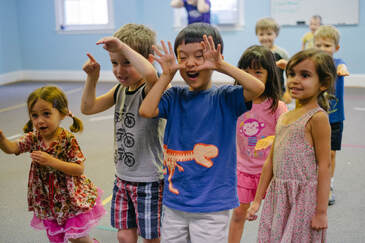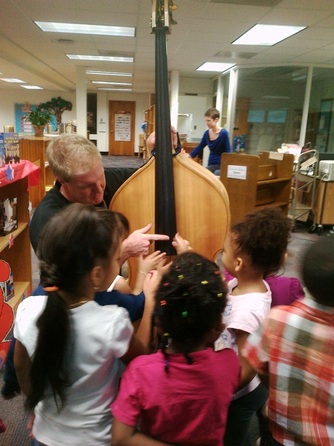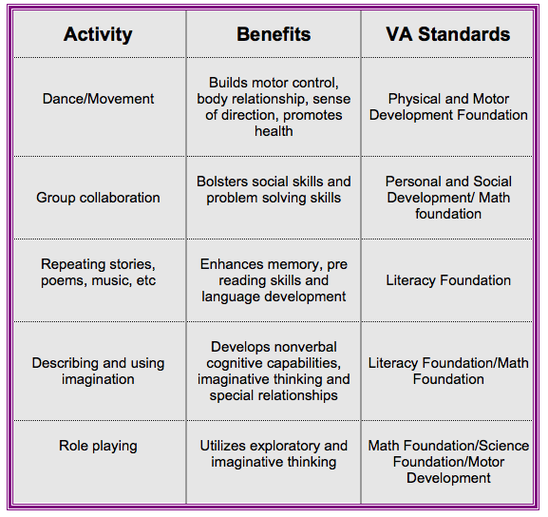Early childhood is all about discovery. Young children learn from exploring the world around them: observing, reaching, touching, smelling, tasting, mimicking and more! The Arts are a perfect partner for early childhood learning because they encourages experimentation and discovery. Theatre, Drama, and Creative Play allow young children to develop their own creative expression and imagination.
|
Creative Play helps your child grow!
Social and Emotional Development: Pretending to be other characters gives children the tools to express and cope with their emotions. Creative play engages social development through the interaction with other children and caregivers. Language Skills: Drama and theatre can improve a child’s language skills by giving them an opportunity to try out new words and phrases. Physical Development: Creative movement and imaginative play foster physical development: both sensory and motor skills. Problem-Solving Skills: Creative play develops critical thinking and problem solving skills as your child reenacts favorite stories and new adventures. Early Literacy Skills: Creative play makes connections between stories on the page and words used to communicate. These connections will be important as your child learns to read. |
For more information about the benefits of creative play check out:
The Importance of Pretend Play (Scholastic)
The Whole Child: Creativity and Play (PBS)
Storytelling and Creative Play Resources (Earlyarts)
The Importance of Pretend Play (Scholastic)
The Whole Child: Creativity and Play (PBS)
Storytelling and Creative Play Resources (Earlyarts)
|
Here are some creative play activities and tools you can use at home:
After you read your child’s favorite story, act it out. Read a page at at time and bring it to life! You might pretend to make mischief like Max in Where the Wild Things Are? Maybe you’re the bus driver and your child is the pigeon, trying to convince you to let her drive the bus? You can use costumes and props to set the scene. Stretch your child’s creativity by using household objects in unexpected ways. You could use office or kitchen supplies to make music. Pretend you’re a real band! You might build a castle or fort with pillows, blankets, or cardboard boxes. Your little one can be the hero and save you from a dragon in the castle! |
For more creative play activities and tools check out:
Learning4Kids offers a fun list of creative play options.
The Imagination Tree has hands-on activities to get your little one playing and imagining.
Kiwi Families offers advice on the benefits of creative play and a helpful list of supplies to stock your home for imagination adventures.
Learning4Kids offers a fun list of creative play options.
The Imagination Tree has hands-on activities to get your little one playing and imagining.
Kiwi Families offers advice on the benefits of creative play and a helpful list of supplies to stock your home for imagination adventures.
Want to read studies on the Arts and Early Childhood Education?
Our early learning specialists recommend the following articles and studies:
Our early learning specialists recommend the following articles and studies:
- The Seven Benefits of Arts in Early Childhood (Early Arts)
- DoSomething.org: 11 Facts About Arts in Education.
- Ruppert, Sandra S. Critical Evidence: How the ARTS Benefit Student Achievement. Critical Evidence: How the ARTS Benefit Student Achievement. Arts Education Partnership, 2006. Web.
- Sara Goldhawk (Arts Education Partnership): Young Children and the Arts: Making Creative Connections.
- Wolf Trap Foundation for the Performing Arts: Engaging Children.
|
According to current education research, learning styles are moving toward more hands on learning – children learn from manipulatives, telling, explaining, making connections and reflecting. Just like performance, this type of learning style relies on the process just as much as the outcome.
Did you know?
|
Research shows that the arts support the development of skills in creativity, critical thinking, collaboration, and communication. Children will encounter these same skills through holistic frameworks, such as 21st century and project based learning, in their future schooling. Therefore, Early art education is not only important because is a natural avenue of children’s inner drive of play and curiosity, but it also aligns with today’s teaching techniques that aim to prepare the 21st century. Preschool-age children are ready for learning and are accepting of most art forms. According to Goldhawk (1998) and Advocate for Arts (2002), some benefits or early art education include
- Plays a central role in cognitive, motor, language, and social-emotional development.
- Engages learning, stimulates memory, facilitates understanding, enhances communication (verbal and nonverbal), promotes relationships, and provides an avenue for building competences.
- Provides a natural source of learning. Child development specialists note that play is the way children promote and enhance their development.
- Strengthens problem-solving and critical-thinking skills
- Impacts on the developmental growth of every child across socio-economic boundaries.
- Higher civic engagement, more social cohesion, higher child welfare, and lower poverty rates. A vibrant arts community ensures that young people are not solely raised in a pop culture and tabloid marketplace.
- Teaches children life skills such as decision making, developing the ability to imagine what might be and accepting responsibility to complete tasks from start to finish.
- Nurtures values, such as team-building skills, respecting opinions, and being culturally aware
|
An arts enriched curriculum:
All of these are essential components for academic and future success. An early arts education not only lays the foundation for future learning, but also is age appropriate learning through Virginia standards. To the right are some ways that Arts on the Horizon contributes to art integration, the benefits for children, and respective VPI standards: |
Additional Resources:
- Moore, B. & Caldwell, H. (1993). Drama and drawing for narrative writing in primary grades. Journal of Educational Research, 87(2).
- Heath, S. B. (1998). Living the Arts Through Language and Learning: A Report on community-based youth organizations . Americans for the Arts: Monographs, 2(7). Retrieved, from http://www.americansforthearts.org/NAPD/
- Gelineau, R. P. (2004). Integrating the arts across the elementary school curriculum. Belmont, CA: Thomson/Wadsworth.
- Gunning, T. G. (2005). Creating literacy instruction for all students (5th ed.). Boston, MA: Allyn and Bacon.
- Advocate for the Arts. (2002). Americans for the Arts. Retrieved, from http://www.artsusa.org/get_involved/advocate.asp
- Early Childhood STEM Learning Through the Arts | Wolf Trap . (2012) Wolf Trap Foundation for the Performing Arts | Wolf Trap . Retrieved from http://www.wolftrap.org/Education/Institute_for_Early_Learning_Through_the_Arts/STEM_and_the_Arts.aspx
- Great Performances . Educational Resources . Howard Gardner's Multiple Intelligences Theory Overview | PBS. (2012). PBS: Public Broadcasting Service. Retrieved from http://www.pbs.org/wnet/gperf/education/ed_mi_overview.html
- Reys, R. E. (2012). Helping children learn mathematics (10th ed.). Hoboken, N.J.: J. Wiley.
- Sara Goldhawk (1998). Young Children and the Arts: Making Creative Connections. Arts Education Partnership. Retrieved, from http://www.artsdel.org/ArtsEducation/YoungChildren.pdf
